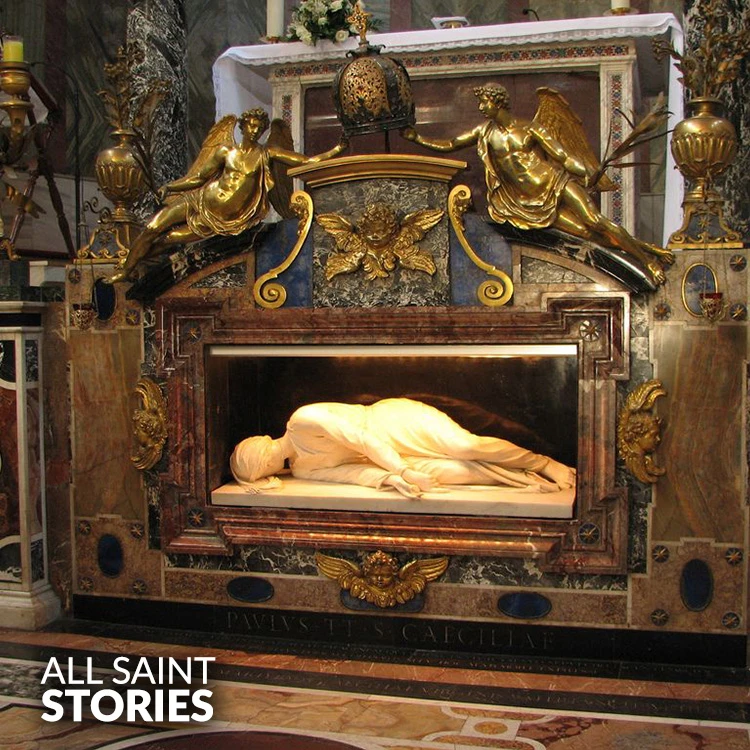"St. Cecilia, patron saint of musicians and singers, Pray for us that we may use our voices and talents to glorify God. Guide us to serve with love, and inspire our hearts with joy. Intercede for us, that we may always be faithful and grateful for the gifts we have received. Amen."
ST. CECILIA (VIRGIN, MARTYR)
ST. CECILIA (VIRGIN, MARTYR)

t. Cecilia is a virgin and martyr of the early Church, renowned as the patron saint of musicians. Despite intense persecution, she remained faithful to Christ and was martyred in Rome. Her incorrupt body was discovered centuries later, confirming her holiness.
St. Cecilia was born into a noble Roman family, likely between 200–230 AD. From a young age, she dedicated herself to Christ and took a vow of virginity, despite being betrothed to a nobleman named Valerian. On her wedding night, Cecilia revealed her Christian faith to her husband, telling him that an angel guarded her purity. Moved by her devotion, Valerian converted to Christianity after being baptized by Pope Urban I. His brother, Tibertius, also embraced the faith.
At the time, Christianity was illegal in the Roman Empire, and converts often faced persecution. Valerian and Tibertius dedicated themselves to burying Christian martyrs, which led to their arrest and execution by Roman authorities. Cecilia was later arrested and condemned to death for her unwavering faith.
Her execution was brutal. Initially, she was sentenced to death by suffocation in a steam-filled bathhouse, but she miraculously survived unharmed. The executioners then attempted to behead her, but after three strikes, her head was not completely severed, and she lingered in agony for three days, using her final moments to pray and comfort others. Before dying, she extended three fingers on one hand and one on the other, symbolizing her belief in the Holy Trinity.
After her death, she was buried in the Catacombs of St. Callixtus, and her home in Trastevere, Rome, was later converted into a church in her honor. In 1599, her tomb was opened, and her body was found incorrupt, lying as if in peaceful sleep, which was considered a miraculous sign of her sanctity.
St. Cecilia is the patroness of music and musicians because it is said that she sang in her heart to God even during her suffering. Many churches, musical compositions, and festivals have been dedicated to her throughout history.
Video Not Found
The information on this website is compiled from various trusted sources. While we aim for accuracy, some details may be incomplete or contain discrepancies.
If you notice any errors or have additional information about this saint, please use the form on the left to share your suggestions. Your input helps us improve and maintain reliable content for everyone.
All submissions are reviewed carefully, and your personal details will remain confidential. Thank you for contributing to the accuracy and value of this resource.
Credits & Acknowledgments
- Anudina Visudhar (Malayalam) – Life of Saints for Everyday
by Msgr. Thomas Moothedan, M.A., D.D. - Saint Companions for Each Day
by A. J. M. Mausolfe & J. K. Mausolfe - US Catholic (Faith in Real Life) – Informational articles
- Wikipedia – General reference content and images
- Anastpaul.com – Saint images and reflections
- Pravachaka Sabdam (Malayalam) – Saint-related content and insights
We sincerely thank these authors and platforms for their valuable contributions. If we have unintentionally missed any attribution, please notify us, and we will make the correction promptly.
If you have any suggestion about ST. CECILIA (VIRGIN, MARTYR)
Your suggestion will help improve the information about this saint. Your details will not be disclosed anywhere.
© 2026 Copyright @ www.allsaintstories.com







 English
English
 Italian
Italian
 French
French
 Spanish
Spanish
 Malayalam
Malayalam
 Russian
Russian
 Korean
Korean
 Sinhala
Sinhala
 Japanese
Japanese
 Arabic
Arabic
 Portuguese
Portuguese
 Bantu
Bantu
 Greek
Greek
 German
German
 Dutch
Dutch
 Filipino
Filipino